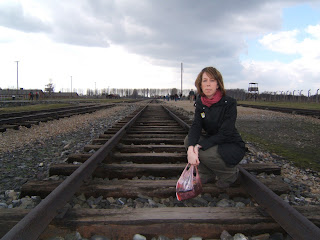Her investigation of trauma is an inquiry into how affective experience that falls outside of institutionalized or stable forms of identity or politics can form the basis for public culture. She basically wants to focus on how trauma makes its way into the everyday lives and the material details of experience.
The first thing I want to address is her discussion of trauma as a category of national, public culture. What kept playing into my mind as I was reading this section was 9/11. What I think is ‘funny’ is how the States took this tragic event as an excuse for what they were already doing overseas. Not only that but their excuse was irrelevant as they were targeting a different group than that of who they accuse of doing this. They have and still are fighting this battle and killing innocent people in the process, including their own soldiers. I think it just reinforced American national unity and identity, and ideas and assumptions about what they view as the ‘Other’.
Secondly, I found significant the idea that "public culture takes as a starting point the nation as a space of struggle, seeking to illuminate the forms of violence that are forgotten or covered over by the amnesiac powers of national culture, which is adept at using one trauma story to suppress another." In a different light, culture doesn’t see sexism as issue of trauma anymore but thinks it has been resolved and as a result has moved on to something else. Another example of this how ‘news worthy’ events;.we focus on them for a little while and then move on to what we consider more traumatic and rarely go back to those events and the aftermath. There is too much focus on the immediate.
I enjoyed the section about the 2.5 Minute Ride mostly because I could relate, having been to Auschwitz and Birkenau. Holocaust offers representations, which are the product of successful efforts to create a culture around a historical trauma. The author looks at juxtaposition of visiting the Holocaust. When I visited the site, it felt very surreal, almost made up in some areas. It has become a museum more than anything. It is only upon visiting the grounds of Birkenau that you ‘feel’ the trauma I think. I felt like the grounds were enough, I didn’t need to see the many objects collected and displayed through a window. Cvetkovich writes that "the challenge it addresses is how to make room for another kind of story in the face of the hyperrepresentation of the Holocaust and its saturation of the cultural landscape by a proliferation of horrific images."(23) As you can observe from the pictures, I also felt that I should not smile or show any sense of pleasure from being there. I had it in my head that I had to be in a particular mood when I was there and I this began from the moment I got in the train from Kracown. I’m not denying the true feelings that came of being there or the significant impact it had on my identity as a historian but I somehow had to make it worse in my head to do the place justice.


Finally, what I retained the most from this work is the need to push boundaries, not to be in the either or categories. This idea of everyday insidious trauma which Cvetkovich refers to, made me question the measurements of the impacts of trauma. It is a very difficult question to debate. Even after having spent some time on the issue in class, I still cannot decide if we can even begin to deconstruct trauma. How does one judge what is a "bigger" trauma than an other. There is a tendency to think that larger public traumas are more devastating than everyday life traumas. Truthfully, a build up of everyday trauma can be just a devastating, like the example we discussed about living with the repercussions of colonialism and how this oppression is part of the everyday. It affects how individuals shape their identities. Thus it is how you interpret your trauma and what it symbolises to you. We feel trauma and are not victims of it and it is a positive thing to feel what your life is like/your everyday and in the end make culture with it.
